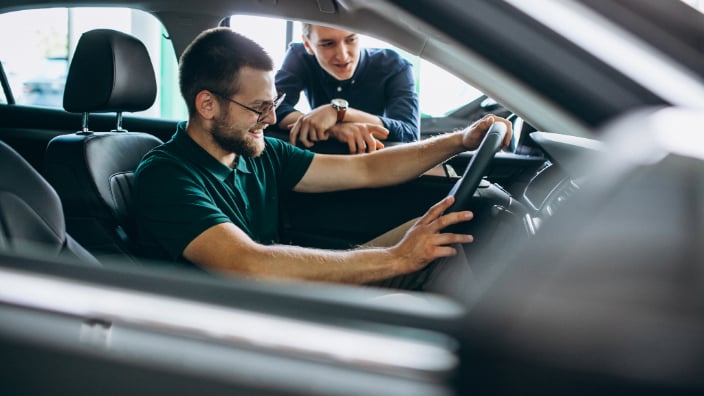According to Scamwatch, Australians reported more than 249,000 scams in 2024, with a staggering $318 million in losses.
One type of scam tripping up many Aussies relates to car sales. Some buyers and sellers aren't who they say they are. Instead, they're criminals looking to make a quick buck from the second-hand car market by tricking unsuspecting, genuine shoppers.
Here's what you need to know about car sale scams.
Common types of car sale scams
These are the types of scams malicious actors use to victimise innocent buyers and sellers:
- Fake buyers pretend they can't inspect the car because they work remotely, are on holiday, or give some other excuse. But they willingly offer full payment via bank transfer or PayPal, then ask you to cover courier or insurance costs.
- Fake sellers list cars they don't own. The price is far too good to be true, and the photos look real. When you enquire, they pressure you to transfer money right away. But once the funds are sent, the ad disappears, and so do they. You never get the car.
- Fake listings on real sites appear on Facebook Marketplace, Gumtree, or Carsales. The ad itself doesn't throw any red flags, but if the seller insists on moving the conversation off-platform or using odd payment methods, it's probably a scam.
- PayID and PayPal cons trick sellers into sending money to "unlock" a payment. The scam buyer shows a fake receipt and claims the payment is pending. It's not.
- Tampered odometers make a well-used car look almost new. Scammers use software to wipe thousands of kilometres. The good news? A simple vehicle history check can expose this lie.
- Stolen cars are sometimes sold using fake rego papers or cloned VINs.
How to spot a scam when buying or selling a car
A scam often starts with a friendly message and a good price. But there are tell-tale signs. Here's what to look for:
- The other person refuses to speak with you on the phone. Scammers much prefer using SMS and email because it gives them total control. Plus, you can't hear if their voice matches who they say they are.
- Urgency is another giveaway. The scammer will tell you they're moving overseas and that they need to close the deal today. Sure, it sounds plausible, but it's pressure that's meant to stop you from questioning the inconsistencies in their story.
- You might also notice they're unusually decisive. There's no negotiation at all. They agree right away to your price without hesitation. They might even offer more than you're asking. Your first instinct might be to accept a great deal, but don't. Something too good to be true often is.
- In some cases, the scammer will send you a link to a website that looks like a car listing platform or payment service. The branding seems right, but it's a classic phishing trap. As soon as you enter your details, they've got what they came for.
What to do if you think you've been scammed
First things first, don't panic.
If something feels off or if you've already sent money or personal details, the most important thing is to stop. Don't reply or send anything else.
Next, double-check what you've been told. If someone said they were from PayPal, the police, or your bank, call the organisation directly using the number on their official website.
Then, report it. Scamwatch exists for exactly this reason.
In the meantime, if you've given out any banking information, contact your bank. The sooner they know, the better chance they have to protect your account.
Simple steps to stay scam-safe
The best way to deal with a scam is to stop it before it starts. A few simple checks can make all the difference when you're buying or selling a car.
- Stick to local deals. If you can't see the car in person or the buyer can't come to you, don't pursue the sale.
- Look at the rego papers and service history of the vehicle you're buying.
- If they give you an address, pop it into Google Maps to see what's actually there.
- Always trust your eyes and ears. If someone refuses to speak on the phone or will only message you by text or email, take that seriously. It's a sign they're not who they say they are.
- When you're selling, never hand over the car until the payment has cleared - especially if it's by cheque. Don't rely on screenshots or "proof" from the buyer. Log in to your bank account and make sure the money has actually arrived.
- If you're buying, don't rush because someone says they're moving or shipping the car out tomorrow. That's not your problem. A genuine seller will let you take the time you need to ask questions and check things properly.
Scammers rely on pressure and confusion. By slowing down and keeping things local, you're giving yourself the best chance at a safe, smooth experience. And if something doesn’t feel right, stop, take a step back and check - it’s always okay to pause.
This article is intended to provide general information of an educational nature only. Terms, conditions, fees, charges and credit criteria apply. Information in this article is current as at the date of publication.
